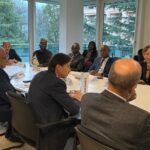The OIF organized an informal online French-speaking meeting on March 27, 2024 on the draft permanent international investment dispute settlement mechanism, ahead of the 48th session of UNCITRAL Working Group III scheduled to take place in New York on March 1, 2024. to April 5, 2024.
Faced with the limits of the traditional investor-State dispute settlement (ISDS) system based on arbitration, a certain number of improvements are expected from the establishment of a judicial-type mechanism, such as better consistency and predictability of decisions rendered, better filtering of unfounded or abusive requests, greater transparency, strengthening guarantees of impartiality of judges or even greater openness towards third parties who are not parties to the dispute but who are affected by it.
The discussions first made it possible to recall the progress of the discussions and to present the draft status of the permanent mechanism, which includes on the one hand a two-level mechanism and on the other hand an appeals body likely to be examined alone. Experts from various backgrounds – academics, arbitration practitioners, civil society experts and representatives of French-speaking countries – then delivered their analyzes of this project and identified points for attention on several issues considered major.
The discussions made it possible to note that a consensus is emerging on the interest of a permanent mechanism to correct certain weaknesses and shortcomings of the current system. Certain provisions of the draft statute mark real progress that is important to preserve. It also involves uncertainties and raises questions about important points to which attention should be paid. Concerning the independence of judges, this is for example the case of the criteria which will govern the designation of the members of the decision-making committee, or of the method of designation of judges, the majority being preferable to unanimity to avoid any blockage. Concerning the consistency and predictability of decisions, the importance of the exclusive dimension of the appeal (which excludes any other recourse) was underlined, as well as the problem raised by the question of recourse to the appeal if the logic of the arbitration is maintained, it does not currently provide for this recourse. Regarding openness to third parties, the permanent mechanism offers an opportunity to allow them to access justice when affected by a dispute, which should not be missed. Likewise, the reform presents the opportunity to create articulation with national and regional courts whose potential to deal with certain cases should be taken into account, allowing at the same time to lighten the workload of the multilateral court.
The meeting also provided an opportunity to discuss the proposed consultative center status. The French-speaking countries recognize the importance of setting up this center to strengthen the skills of the respondent States, particularly in the South, and are calling for the new institutions to have a regional office dedicated to French-speaking countries.
This informal meeting was part of the OIF’s support for the participation and contribution of French-speaking countries to discussions on a possible ISDS reform at UNCITRAL. It brought together around thirty participants representing a dozen countries and nearly a dozen international and regional organizations. A summary of the discussions is available below.
Reform of investor-State dispute settlement: informal French-speaking meeting on the draft permanent mechanism

Leave a comment
Leave a comment







